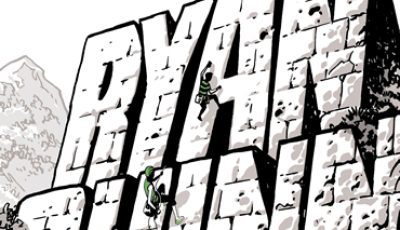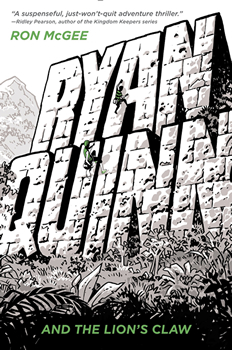

Ryan Quinn and the Lion’s Claw by Ron McGee
 By Sonja Stone
By Sonja Stone
This month, RYAN QUINN AND THE LION’S CLAW—the second novel in Ron McGee’s middle grade adventure series—was released to eager fans. His debut, Ryan Quinn and the Rebel’s Escape, introduced readers to hero Ryan Quinn, whose parents covertly work for the Emergency Rescue Committee, an organization that performs perilous rescue missions around the globe.
McGee took time to speak with The Big Thrill about his latest novel, his experience writing for television, and how to introduce global issues in an exciting, youth-friendly way.
I love that your adventure series isn’t fantasy-based. You’ve successfully written fantasy before (Disney Channel’s Halloween hit Girl vs. Monster). Why did you decide to keep the Ryan Quinn novels grounded in reality?
So many of the books available to kids and teens are steeped in fantasy and dystopian worlds. I love those books and devour them myself, but I also love the real-world action and adventure found in adult thrillers. With Ryan Quinn, I hoped to create a hero for younger readers who doesn’t have powers or magic to rely on. Ryan’s pretty exceptional as teens go—he’s been unknowingly trained by his parents to be a spy from a young age—but in the end, he only has his wits, his skills, and his friends to rely on when he’s in trouble. In that way, he’s not that different from any one of us.
I also wanted to keep the books grounded because they deal with issues that have real-world significance. Ryan and his family have helped people escape over the years from all sorts of dangerous places. The countries in my books are fictionalized, but they have counterparts in reality where dictators, fundamentalism, and greed make life unbearable, and even deadly for some of their citizens. My books are aimed at kids and teens, so I can’t explore these difficult issues too deeply. But hopefully, the adventures are enough fun to keep kids reading, but also stimulate conversations with parents and teachers about what’s going on in the world.
You’ve written for both adults and middle graders. Do you have a preference? Which do you find more challenging?
I really just love telling stories. Some are better for kids and others for adults, but they can be equally rewarding. Writing for adults on a television series, especially the crime shows I’ve worked on the last few years, offers opportunities to explore current issues and more nuanced characters. That’s always interesting to me, with an endless source of stories in every newspaper or magazine I read.
Writing for middle graders, though, allows me to let my imagination run free and can be a lot more “fun.” I get to take the teens on adventures all around the world, put them in seemingly impossible situations, and then figure out a way for them to finally save the day. Finding the middle ground between grounded and fantastical is a continual challenge, but it’s one of my favorite aspects of writing for middle graders.
Your Ryan Quinn series is planned as a trilogy. When you started, did you know where each book would go? Did you discover anything surprising as you wrote the second novel?
When I started the first Ryan Quinn, I had no idea where the series would lead. I knew the core story of Ryan and his family’s involvement in the Emergency Rescue Committee over the decades. But as I began to discover the other characters in Ryan’s world, I discovered their stories to be equally as compelling. Getting inside their heads and writing chapters from different characters perspectives shaped the book, which wasn’t my original plan.
In the second book, that mix of perspectives became even more important. Even though I outlined the overall story, I constantly had to adjust as the characters made choices that surprised me and took the action in directions I hadn’t planned. Because the stories are interwoven so closely, those changes had repercussions for all the storylines. Sometimes it made the writing more challenging, but more fun, too.
With each book, more details and surprises about Ryan’s personal history are emerging and shaping the stories. Each novel is designed as a stand-alone adventure, but the continuing revelations about Ryan and his family continue from book to book. By the end of RYAN QUINN AND THE LION’S CLAW, long-buried secrets will have emerged, and will fundamentally affect Ryan and his family moving forward.
You mentioned that Ryan’s friend Kasey had a Nancy Drew-esque adventure during RYAN QUINN AND THE LION’S CLAW. Are you considering another series, maybe with Kasey as the lead?
One of the biggest surprises in writing RYAN QUINN AND THE LION’S CLAW was the prominent role that Ryan’s friend Kasey took. While Ryan and Danny are off to Africa for an adventure, Kasey stays in New York, getting more deeply involved in the Emergency Rescue Committee and helping in ways she never imagined. Kasey emerges as a smart, brave, and highly capable heroine. I’m hoping to at least write a short story, possibly an e-book, in which she finally gets to have her own adventure.
After successfully accomplishing both screenplay and novel, do you have any advice for novelists looking to write for television?
One of the great things about writing novels is the ability to explore the interior worlds of your characters. The complexity of emotions and motivations can be described in detail, bringing the reader closer to understanding how a character thinks and why they make the choices that guide the story. In a teleplay or screenplay, the writer often doesn’t have the luxury of getting inside a character’s head so directly. The audience only knows what they see on the screen. So finding ways to illuminate character through action and dialogue is the constant challenge facing screenwriters. Every line a character says and every choice they make become vital to keeping audiences engaged.
A teleplay looks almost skeletal on the page, which often makes people think they are “easy” to write. But what separates good screenplays from weak ones is how much substance, depth and nuance get packed into those few lines. Each choice becomes important, from location and action descriptions to the individual characters’ points of view in every scene. If a novelist can take all the hard work and thoughtfulness that went into their books and distill that into potent—but concise—scenes, they’ll be well on their way to creating a successful screenplay. And a polished, smart, grab-you-by-the-throat script is the quickest way to get a job writing for television.
*****
 Ron is a winner of the Writers Guild of America award for his work on Disney Channel’s Halloween hit GIRL VS. MONSTER. A writer and producer of TV series, he has written for the crime dramas NCIS: NEW ORLEANS, RIZZOLI & ISLES and the action-adventure THE NINE LIVES OF CHLOE KING. Ron has penned numerous movies for television covering everything from the story of boy-band The Monkees to epic disasters to behind-the-scenes dramas of sitcom favorites SAVED BY THE BELL and FULL HOUSE. Ron lives with his family in California.
Ron is a winner of the Writers Guild of America award for his work on Disney Channel’s Halloween hit GIRL VS. MONSTER. A writer and producer of TV series, he has written for the crime dramas NCIS: NEW ORLEANS, RIZZOLI & ISLES and the action-adventure THE NINE LIVES OF CHLOE KING. Ron has penned numerous movies for television covering everything from the story of boy-band The Monkees to epic disasters to behind-the-scenes dramas of sitcom favorites SAVED BY THE BELL and FULL HOUSE. Ron lives with his family in California.
To learn more about Ron, please visit his website.
- Ryan Quinn and the Lion’s Claw by Ron McGee - October 31, 2017
